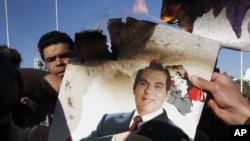TUNIS —
In post-revolution Tunisia, some fear that free expression is again under threat after violent protests this month against an Internet video mocking the Prophet Muhammad shocked many in the North African country. Tunisians worry the violence underscores growing threats to a cornerstone of the country's 2011 revolution.
Artist Nadia Jelassi got into trouble over three veiled women…or at least her depiction of them - busts covered in fabric and newspaper and surrounded by stones. One of them is still missing, after protesters attacked an art exhibition outside Tunis on grounds it offended Islam.
Jelassi wanted viewers to interpret her art as they liked. But she says the most obvious interpretation is of women being stoned.
Religious extremists have since launched a vitriolic campaign against Jelassi and other artists in the exhibition. She says some received death threats. Salafists have posted the names and phone numbers of targeted artists on social media sites.
Tunisia's judiciary has also waded into the controversy. Jelassi and another artist are accused of disturbing public order - a charge that can carry a prison term.
Jelassi is hardly the only creator under fire in this North African country. Protesters attacked the U.S. Embassy in Tunis this month, enraged by a privately-made video produced in the U.S. denigrating the Prophet Muhammad. Police thwarted another protest last week against French cartoons also mocking the Muslim prophet. Other controversial films aired here have also been attacked.
Today, rights activists like Mokhtar Trifi fear the ruling Islamist party Ennahda may capitalize on the anger to pass a blasphemy law. Draft legislation aims to criminalize offenses against so-called "sacred values."
Trifi says Ennahda wants to portray itself as the defender or Islam. With elections expected next year, he says, its aims are political.
More broadly, activists say, free expression - a cornerstone of Tunisia's revolution - is under threat. Some media groups are protesting government-appointed bosses who run key media outlets. At publishing house Dar Assabeh, journalists like Sana Farhat have staged a month-long sit-in.
"The objective of this nomination [of the boss] is to change the editorial line of Dar Assabeh," explained Farhat. "We are defending our independence and our liberty and our freedom of press, of expression."
The government rejects accusations that it is trying to stifle free expression.
But at Ennahda's headquarters, party leader Rachid Ghannouchi says Tunisia must also strike a balance.
Ghannouchi says Ennahda supports free expression and artistic creation. But Tunisians can only live in peace if they also respect each others' beliefs.
Ghannouchi says many artistic works critical of Islam are not attacked, because they are produced by serious academics. He says Jelassi's work is a deliberate provocation.
Jelassi is waiting for the day she is out of the public spotlight and free to concentrate on her art. But in this politically-charged country, that doesn't seem likely anytime soon.
Artist Nadia Jelassi got into trouble over three veiled women…or at least her depiction of them - busts covered in fabric and newspaper and surrounded by stones. One of them is still missing, after protesters attacked an art exhibition outside Tunis on grounds it offended Islam.
Jelassi wanted viewers to interpret her art as they liked. But she says the most obvious interpretation is of women being stoned.
Religious extremists have since launched a vitriolic campaign against Jelassi and other artists in the exhibition. She says some received death threats. Salafists have posted the names and phone numbers of targeted artists on social media sites.
Tunisia's judiciary has also waded into the controversy. Jelassi and another artist are accused of disturbing public order - a charge that can carry a prison term.
Jelassi is hardly the only creator under fire in this North African country. Protesters attacked the U.S. Embassy in Tunis this month, enraged by a privately-made video produced in the U.S. denigrating the Prophet Muhammad. Police thwarted another protest last week against French cartoons also mocking the Muslim prophet. Other controversial films aired here have also been attacked.
Today, rights activists like Mokhtar Trifi fear the ruling Islamist party Ennahda may capitalize on the anger to pass a blasphemy law. Draft legislation aims to criminalize offenses against so-called "sacred values."
Trifi says Ennahda wants to portray itself as the defender or Islam. With elections expected next year, he says, its aims are political.
More broadly, activists say, free expression - a cornerstone of Tunisia's revolution - is under threat. Some media groups are protesting government-appointed bosses who run key media outlets. At publishing house Dar Assabeh, journalists like Sana Farhat have staged a month-long sit-in.
"The objective of this nomination [of the boss] is to change the editorial line of Dar Assabeh," explained Farhat. "We are defending our independence and our liberty and our freedom of press, of expression."
The government rejects accusations that it is trying to stifle free expression.
But at Ennahda's headquarters, party leader Rachid Ghannouchi says Tunisia must also strike a balance.
Ghannouchi says Ennahda supports free expression and artistic creation. But Tunisians can only live in peace if they also respect each others' beliefs.
Ghannouchi says many artistic works critical of Islam are not attacked, because they are produced by serious academics. He says Jelassi's work is a deliberate provocation.
Jelassi is waiting for the day she is out of the public spotlight and free to concentrate on her art. But in this politically-charged country, that doesn't seem likely anytime soon.








